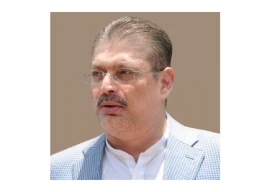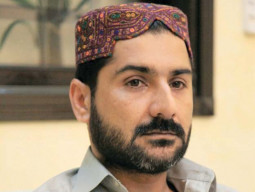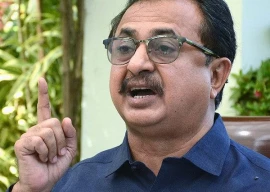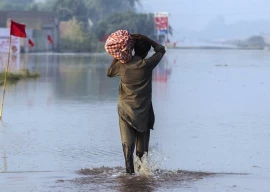
When it’s time for school, they gather around Baba Ghulam Haider, an elderly survivor living at the camp, who has taken up the responsibility of walking all the children to school and then bringing them back.
“I want all of them to get educated and become doctors,” hopes Haider, who is very happy that he can play his part in helping out the children.
The headmistress of Razzaqabad Government School decided to open their facilities for the children living at the Razzaqabad relief camp, believed to be the largest in the city. Nasreen Razzaq, the 40-year-old headmistress, was saddened by the floods that destroyed the lives of these people, who ended up living at camps with meagre resources. Hence, she decided to impart education to all the children at the camp and help them overcome their misery.
“These people have arrived here with nothing and they love to study,” she explained. “A lot of students come to the school and they do not even skip classes,” she added happily.
The teachers at Nasreen’s school also jumped at the opportunity to help the survivors and can be seen diligently taking lessons through the day.
The school, however, lacks basic necessities, such as desks, so most of the children have no choice but to sit on the floor. Water supply to the building is also not consistent but nothing can dampen the enthusiasm of these little survivors.
Flood survivors to study at private schools
The provincial education department has decided to continue classes for students of government schools, which have been shut down due to the floods, at private schools near relief camps. The classes will be held in the in the afternoon hours.
The Directorate of Private Institutions Sindh has asked EDOs education through the province to submit details about closed government schools and the students who were studying there for this purpose.
“Private schools are being requested to make this move possible,” said Mansoob Siddiqui of the Directorate of Private Institutions Sindh. “We are facing a national crisis and private schools will have to play their role at this crucial stage.”
Children’s life at camp
Meanwhile, our correspondent Masror Hausen visited the Razzaqabad camp and believed that the resilience and strength of the people of Pakistan shows through despite the devastating floods.
More than half of the flood-affected people were children but those living at Razzaqabad are not worried about anything.
Most of these children are from the northern districts of Sindh - Kandhkot, Ghotki, Ghouspur, Sultanpur, Thul, Shikarpur and Jacobabad.
For them, this is indeed a never-ending picnic. Riding a train, staying away from house chores, meeting new friends, no schools and no homework - one big adventure.
However, the doctors think differently.
They believe these children are already facing post-traumatic syndrome as they were exposed and vulnerable.
A bunch of kids cobbled together for him to listen to their musical show. “The children were having a ball... singing and dancing away not knowing what the future holds for them,” he noted.
But there was one little girl, Azra, who could not have fun the same way as other children did. “Azra is physically challenged. She cannot walk or talk,” explained her father, adding that the doctors have been unable to treat her.
A doctor at the medical camp was jubilant that he had this opportunity to serve these people. “Post-traumatic syndrome is rampant [at the camp], but we have managed to control gastroenteritis,” he said.
Published in The Express Tribune, August 26th, 2010.
This article has been revised to reflect the following correction:
Correction: August 26, 2010
Due to a transcription error, an earlier version of this article omitted the word 'think' in the line 'However doctors think differently.'




1725967717-0/Untitled-design-(3)1725967717-0-165x106.webp)
1730547935-0/Untitled-design-(5)1730547935-0-270x192.webp)











COMMENTS (2)
Comments are moderated and generally will be posted if they are on-topic and not abusive.
For more information, please see our Comments FAQ